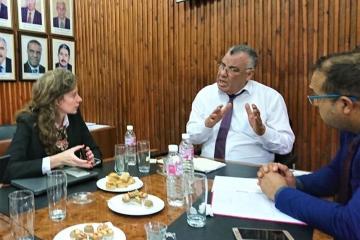
Patrya Pratama, J-PAL ’15, leverages his policy experience to build an education nonprofit

The Alumni Spotlight series highlights J-PAL alumni who are making an impact across industries and around the world. To nominate a J-PAL alum to be featured in a future Alumni Spotlight, please fill out this form.
Patrya Pratama joined J-PAL Southeast Asia as a senior research associate in 2014, where he laid the groundwork for an intervention aimed at increasing enrollment in public health insurance among informal workers, and trained policymakers in program evaluation fundamentals. After working as a policy advisor in both national and local government in Indonesia, he founded and now leads the education-focused INSPIRASI Foundation. He joined us to reflect on lessons learned over the course of his public policy career and chat about his work at INSPIRASI.
What drew you to the field of public policy?
It began with my very first job at Gerakan Indonesia Mengajar (Indonesia Teaching Movement), which is essentially like the Indonesian version of Teach for America. I was placed in a village of East Kalimantan province on the island of Borneo—a pretty remote area—where I taught for a little over a year.
At the school where I worked teachers were undersupplied, infrastructure wasn't that great, parental engagement with the student learning was very minimal, and local leadership seemingly couldn't care less about education. That experience grew my interest in public policy—I knew that those conditions must have stemmed from certain decisions made at either the local government level, municipal level, or even at the central government level.
I didn’t go into policy immediately after that experience. I took on another job as a communications consultant for the European Union office in Indonesia, but then my work for them was accidentally related with their development program. Then I decided to take on my master's study in public policy after that.
You worked at J-PAL as a senior research associate on a public health intervention for informal workers. Can you tell us about your role?
I worked with [J-PAL SEA Co-Scientific Directors] Rema Hanna and Ben Olken on the pre-pilot of an evaluation of an intervention aimed at increasing voluntary enrollment in Indonesia’s national health insurance program among informal workers.
That was my very first time doing the design work, implementation planning, and then actual field work with the enumerators themselves. It was kind of overwhelming at first. I quickly learned that it’s one thing to design everything on paper, looking at what has worked in the past and what the principal investigators (PIs) think might work, but it's completely different when you’re on the ground and see what's actually working and what the beneficiaries think of the intervention. And then you have to serve as the bridge between what’s happening on the ground and the PIs, helping them to effectively communicate learnings to our government partners.
This communication element is really crucial—sometimes more often than not, implementation is the policymaker’s blind spot. They may have this concept and plan, but then they don't really know what's actually happening on the ground. At the same time, if you communicate about the intervention and evaluation in ways that are too complicated or missing the big points, then it doesn't really mean much.
Research roles at J-PAL often have a component of training others in government and NGOs in impact evaluation methodology. What are some interesting takeaways from your experience leading evaluation trainings?
Through doing these trainings, I learned that what tends to be of most value for government participants is simply providing them with the tools for understanding how to think about a program’s effectiveness. This was often as simple as thinking about input activities, output, and then impact. Many of them have heard of this, but have never really looked at their programs in that way before. The training is a good opportunity for them to look at their work from a more critical perspective.
That’s why in my trainings we talked a bit about randomized evaluations, so they have a general idea, but the majority of the training is about basic evaluation. What is interesting for us is that after the training, participants are often left with more questions than answers because now they question a lot of the components of the program that they're running.
As the founder and executive director of the INSPIRASI Foundation, could you tell us a bit about your organization and what your motivation was for launching it?
The INSPIRASI Foundation is a nonprofit focusing on school leadership—specifically school principals in Indonesia. We’re trying to find an alternative model of effective professional development programming for principals across Indonesia.
In the majority of Indonesian schools, principals are not well equipped to lead learning in their own schools. We call this the learning crisis: where kids are in school, but they don't really learn. One reason behind the learning crisis may be that teachers don't teach well, but another may be that the institution itself is not really geared towards learning. We are testing out interventions that can help principals better guide learning in their schools.
I founded INSPIRASI two and a half years ago, and we now have a team of eight. We are already in the second pilot of our program, working with close to 83 school leaders in Indonesia. We’re hoping to wrap up our pilot next year, and then decide how we could scale it up with the government.
I’d say we are somewhat unique in Indonesia’s education nonprofit space because we are focusing on system-level change, which means not only do we pilot our intervention program on the ground, but also we make sure the local structures and related government agency are able to adopt and develop capacity to manage the program sustainably. So, the full picture of the results could happen in a long term. We don’t focus on reach so much as whether at the end of the program, did student learning really improve? Does the local agency have enough capacity to take over after our direct involvement ends?
It sounds like every day is a learning experience. How have your experiences working in government or at J-PAL helped you with launching this foundation?
Every role in my past has come into play now. For example, we want the government to be involved in the planning part from the earliest stages, because they need to have a sense of ownership of the program. This is especially important in the Indonesian context, where education is very decentralized, and the success of a program really falls into the hands of whether the local government has an interest in its success. My experience working in government has helped me to identify and engage the right people within the government.
My time at J-PAL taught me to pay attention to the nitty gritty of the implementation side. For example, education interventions often involve some sort of training. But trainers have a tendency of doing whatever he or she can to help the trainees to perform well, which often goes outside the initial design of the intervention. For the sake of being able to properly evaluate the impact of the program, I’ve learned to really ensure that trainers stick to the designed training.
Having worked across a wide spectrum of policy roles, from research to politics to nonprofit administration, what advice would you give to those who are interested in pursuing a career in public policy?
At the end of the day, we’re in the development sector, so what matters is whether or not the thing you’re doing has an impact on the ground—are you actually helping the people you’re trying to help? It sounds pretty simple, but in my role now, for example, if you lose your focus on that objective it can be easy to be swayed by other factors.
One such factor is, of course, the political implications of your evaluations. For example, let’s say if the program doesn't work and you’re afraid of angering your government partner, it can be tempting to not express this concern. But however you do it, the message that change is needed must be shared. You just have to figure out a way of getting that across.
We also ought to keep trying to connect the many different stakeholders in public policy: government, researchers, political groups, nonprofits, funding/donor organizations, and the public or beneficiaries themselves. These groups often think and operate in silos, so those who pursue careers in public policy need to be the connector.
Finally, I would say keep monitoring and evaluation top of mind to continue learning and improving our program or policy for our beneficiaries. It is indeed easier said than done, but definitely worth it.




